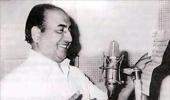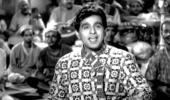''He used to do his homework before singing a song.'
'He used to find out who the hero of the movie would be or the situation in which the song would play in the film.'
'Accordingly, he moulded his voice.'
'For example, he sang Tel Maalish and Main Bambai Ka Babu for Johnny Walker in Johnny Walker style.'
'He would sing in different tones for Shammi Kapoor, Dilip Kumar and Guru Dutt.'

Mohammed Rafi, whose voice lives on in thousands of memorable chartbusters, would have been 100 on December 24.
When he did on July 31, 1980, at the young age of 55, it marked the end of a glorious career that had started with his big break in the song, Yahan Badla Wafa Ka with Noor Jahan in 1947's Jugnu.
"He had made up his mind that he would retire. It was because of a religious issue," Rafisaab's youngest son Shahid Rafi reveals to Syed Firdaus Ashraf/Rediff.com. "He started keeping a distance from the film industry."
On his 100th birth anniversary, what are your thoughts about your father, the legendary Mohammad Rafi?
He is remembered till date. The best proof are the reality singing competitions shows that you see on television.
Many young children sing his songs and they sing very well.
Rafisaab was an institute where music is concerned.
Whoever is a music lover follows Rafisaab.
People talk of gharanas of music but Rafisaab had his own gharana. He made a distinctive mark in the singing world.

Did you ever ask him about his beautiful singing voice?
He always told us that he was nobody, his voice was God's gift to him.
Even today, youngsters who aspire to be singers follow the path of Rafisaab songs.
Parents tell their children to hear his songs before becoming a singer.
Singer Nitin Mukesh told me that his father, the legendary singer Mukeshji, told him that if he wanted to pursue singing as a profession, he must follow Rafisaab's singing.
He sang bhajans too. How did he get so devotional?
He was God gifted.
He used to do his homework before singing a song. He used to find out who the hero of the movie would be or the situation in which the song would play in the film. Accordingly, he moulded his voice.
For example, he sang Tel Maalish and Main Bambai Ka Babu for Johnny Walker in Johnny Walker style. He would sing in different tones for Shammi Kapoor, Dilip Kumar and Guru Dutt.

Today, would his voice have suited Shah Rukh Khan or Varun Dhawan?
He would have done justice, 100 per cent!
I will give you an example. There was a film called Laila Majnu. The lead star was Rishi Kapoor and everybody knew that in those days, (singer) Shailendra was the voice of Rishi Kapoor on screen.
But the music director of Laila Majnu, Madan Mohanji, was adamant he would compose the music only if Rafisaab sang for Rishi Kapoor.
The director H S Rawail told Madanji that Rafisaab was a mature singer while his hero was young, so his voice would not suit.
But Madanji put his foot down.
Rawailsaab gave in, and all of Rishi Kapoor's songs were sung by my father. He moulded his voice in such a manner that no one believed it was not Rishi Kapoor who was singing on screen.

In the 1970s, did it get challenging for Rafisaab with the rise of Kishore Kumar's successful collaboration with Rajesh Khanna?
He had made up his mind that he would retire.
It was because of a religious issue.
He started keeping a distance from the film industry. He was not in need of work at that time.
Later, people told him his singing was his bread and butter. They convinced him that he was a great singer and God had gifted him with a divine voice. They said that he should utilise his singing skills, as he had no other talent like running a business.

Which song brought him back in the 1970s?
In Aradhana, his songs (Baghon Mein Bahar Hain and Gun Guna Rahey Hain Bhawarein) were picturised on Rajesh Khanna.
So to say he was absolutely down is not right.
He had the song Gulabi Aankhen in The Train (1970), which was a hit.
The song Yunhi Tum Mujhse in Sachaa Jhutha was a superhit duet.
I don't think Rafisaab ever had a downfall. It was only my dad's own doing (of doing less work).
What memories do you have of your father?
Memories are for those whom you forget or leave you in life.
Rafisaab has not left us. He is in our minds and hearts.
Rafisaab and my mother were family-oriented. My father never socialised. He would finish his work and come home.
He spent the maximum time with his children.
He was fond of flying kites, playing carrom and badminton.











